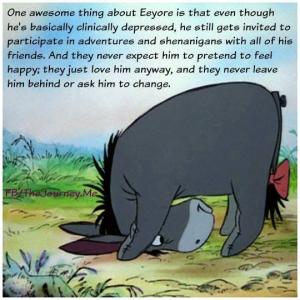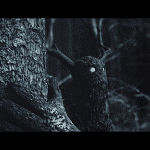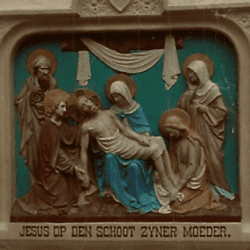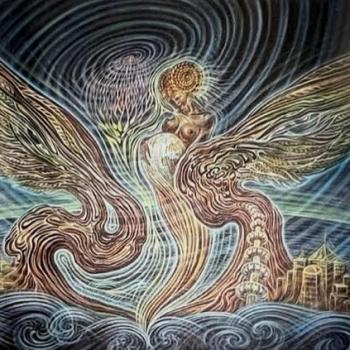 I’ve done it. There have been times when I’ve allowed my identity to become wrapped up in some trauma that happened to me or grief that I’ve experienced. I’ve allowed myself to view myself primarily as a victim. I’ve poo-pooed other people’s journeys of healing because I hadn’t experienced “sufficient” healing in my own life. In times of such felt personal brokenness, to use terms popularized by Fr. Richard Rohr, I “transmitted my un-transformed wounding” onto others. He says that: “If we do not transform our pain, we will most assuredly transmit it.
I’ve done it. There have been times when I’ve allowed my identity to become wrapped up in some trauma that happened to me or grief that I’ve experienced. I’ve allowed myself to view myself primarily as a victim. I’ve poo-pooed other people’s journeys of healing because I hadn’t experienced “sufficient” healing in my own life. In times of such felt personal brokenness, to use terms popularized by Fr. Richard Rohr, I “transmitted my un-transformed wounding” onto others. He says that: “If we do not transform our pain, we will most assuredly transmit it.
Case in point. A formative experience in my life was feeling/being abandoned at a time when I was hurting so badly that I felt a need to act out how bad things were for me; i.e., during, not an actual suicide attempt, but an acting-out of how dire things were for me. They didn’t know I was “just” acting-out, they didn’t know I wasn’t actually going to go through with it. Experiencing that sort of unexpected abandonment by someone leaves quite a mark in one’s heart – one that isn’t easily healed – or even talked about. It’s the sort of thing that one carries with them for a lifetime, and if it isn’t dealt with, it will taint one’s future profoundly. It has unconsciously, and detrimentally, impacted most all of my romantic relationships. I’ve abandoned people in their times of need. I’ve not felt that true healing was possible for me – or even others. I’ve not really meant it (or at least believed it) when I’ve prayed for people (and no, true healing doesn’t mean “amputees regrowing their arms”). At some point, through deep shadow work, what had been unconscious became conscious – and things are shifting.
Transformation is possible. Yes, to help this along, engaging with therapists, clergy, shamans, or specialists can be massively helpful. This is an understatement – especially the assistance of such professionals who’ve experienced their own seasons of devastation, malcontent, and dark nights of the soul. However, it isn’t the case that such healing is only possible for an elect few. It isn’t the case that healing from the traumas of life is just for the 1%. There are a host of self-help books that one can explore – and can be obtained from the local library. There are oceans of helpful articles and inspiration on the internet. There are retreats and workshops one can partake in at a reduced, subsidized rates, if one inquires – and where there aren’t there jolly well should be! There are many personal practices and rituals one can engage in that help shift our minds from perseverating and being only able to perceive the world through the filters of our pain. For me, centering prayer, and practicing “seeing my seeing” while I’m seeing something – being aware of my perceiving/experiencing – and knowing that I am ultimately the awareness of my hurt – not the hurt itself. The amount of collective wisdom regarding these matters is massive. And it really is helpful.
In our journeys toward the seas of healing, we can, however, run into times where we get stuck in the eddies of defeatism, and on the sandbars of self-pity. We can come to moments, seasons, or even years, where we feel so stuck that we come to think that healing for ourselves is an impossibility. And how we view and treat ourselves is how we treat others. We limit ourselves and we thus limit others. And, we wonder why others aren’t rallying to support us — failing to see that they don’t like how they feel when they’re around us when we’re treating ourselves and them in such ways. The good news is that there are friends who are able to be with us in such times. They likely have sensible boundaries about how much time they’re willing to engage with us in this way, but they are there. Eeyore was blessed to have such friends.
So is this person:
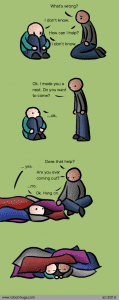 I’m one who identifies as being spiritual *and* religious and I feel that God/Spirit is the ultimate Source of all healing and transformation. Many effective healing professionals acknowledge that they aren’t the real healers, the clients they work with – and/or God – are the real healers. I also contend that:
I’m one who identifies as being spiritual *and* religious and I feel that God/Spirit is the ultimate Source of all healing and transformation. Many effective healing professionals acknowledge that they aren’t the real healers, the clients they work with – and/or God – are the real healers. I also contend that:
All healing is of God – including through: surgery, diet, counseling, massage, yoga, western pharmaceutical medication, meditation, prayer, acupuncture, chiropractic, exercise, nature/sunshine; hypnosis, psychedelics, EMDR, marijuana, CBD oil, chemo-therapy, shamanism, shadow work, breath work, art therapy, music, community service, listing gratitudes; journaling, embracing that it’s okay to not be okay, and more. (frequently, a combination)
Moreover, it is in fact the case that the passage of time truly does help us to shift away from our tendency to Gollumize – and to allow our inner-phoenixes to rise from our respective ashes. Okay, so I just made up a word, but I think it fits. Gollum is a central character in Tolkien’s famed Lord of the Rings trilogy – he was highly possessive/protective of a ring that he had a love-hate relationship with. “Gollumize: (verb)
This tendency is completely human. And it happens a lot. When it shows up in my life, I try to remember – my suffering is not “my precious.” I’m called to wholeness. Healing can happen. Ultimately, I am whole.
It should be said of course that there are certain forms of trauma that humans can experience that are different in kind. Significant trauma such as being kidnapped, spending a year locked in a closet, growing up brutalized by hot curling irons, experiencing incest, gang-rape, witnessing murder, warfare, etc. is clearly of a different order and tragically, coming to a tolerable place of healing is highly challenging in such situations. Such wounding is incredibly hard to transform. That said, the vast majority of suffering can notably shift. Moreover, some people have chronic pain conditions that they often just have to live with.
Poetry, reading the words of others, or writing my own, is one of the things that helps me the most.
Here’s one by singer-songwriter, Jonah Werner, at the end of the intro to his song Ghost:
“..And as prisoners, we wallow in the black of our bars; and in the clink of our chains we waste. And we cry out for mercy and we plead for a passage, incessantly pacing the cage. But this hole is too dark, and this chasm’s too deep and we’ve no way out, so we cave… to the hemorrhaging stench of the life that we’ve spent, in the end for a feast in the grave. And we toast to addiction, and we drink to the thrill, and we talk about leaving (but we know we never will.) Have you heard the door open? Man, I’ve seen people leave. I’ve even heard voices calling, crying out for me.
But it don’t matter, because too far gone are the spoils of my shame, I say, so a voice is a voice just the same… most days. But not on this day. Because on this day there was a change: and it thundered and plundered the stones and it steals out the dust, embracing the rust, as I cling to the mud and the bones. And all of one brilliant siege all I once thought, believed, became dead and it immersed alive: and the bars were no more and the walls fell to the floor and the light marched down the inside. I don’t know about freedom or hope and I’m scared like the soul of a destitute slave who’s been set free but stands still right where he is. He says, “Can I just leave? Can I just walk away?” I say, “Run away, man.” I say, “Run away, man – from your feast in the grave.
I’ll add some of my own poetry. One where I attach to my suffering:
Maybe I’m now at a point where I could be in less, if not no, suffering because I see that I no longer need to be attached to certain things, people, agendas, or outcomes. I’ve dabbled in that pool of non-suffering several times, including some times for numerous days in a row. Thing is, maybe I’d prefer to suffer. Perhaps non-suffering is over-rated. Maybe I’d prefer to hurt because of my losses. Maybe I’d rather live life suffering because it/s/he’s no longer in it, than to live in my more “evolved” and “enlightened” way. Maybe a certain amount of essential pain and suffering is normal and well within factory specifications. Maybe enlightenment is a form of spiritual by-passing, or maybe an authentically enlightened/whole person can consciously choose to suffer and reside in the realm of suffering. Maybe real life means living with grief, loss, and suffering. Maybe the best writing, art, dance, and music come from those who are hurting. Maybe non-suffering is for wimps. Maybe I’m attracted to people who also grieve and hurt because I can relate to them, I have compassion for them. It’s hard to feel much compassion for someone who ain’t got some pathos and passion. It could be that a truly non-anxious, non-suffering, presence isn’t hot or sexy. Or perhaps, if I were further along in my path of evolution, and enlightenment, I’d see the folly of these words and think, “If he only knew X, and unlearned Y…” …maybe.
And one where I feel myself not so wedded to it:
Misty mornin’ The nostalgia of grief, regret, and remorse a year or more later can feel as painful as it did originally. Notice the noticing. You are not the hurt, you’re awareness of it. Lean into it. Breathe through it. “This too shall pass.” What you’re experiencing doesn’t define you. It won’t be what kills you. You’ll die of something but it won’t be this. There’s new love awaiting, new hurts to feel. There’s more to your story. Live.
It’s also helpful for us to be reminded that we’re all in this together. Moreover, we’re complex and we wear three hats as we move through life.
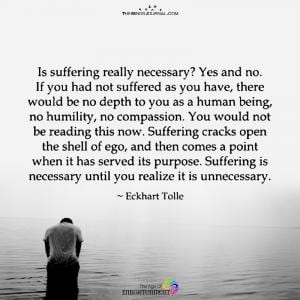 What’s important is knowing that, like flowers, we can turn toward the light. Light has a way.
What’s important is knowing that, like flowers, we can turn toward the light. Light has a way.
May God’s amazing, transforming, and healing, grace, peace, and love be with us all as we do the messy work of healing.
XX – Roger
p.s. I’ll be sharing more about all of this in my upcoming book Mystic Fires: fuel to enliven religious and non-religious hearts and souls.
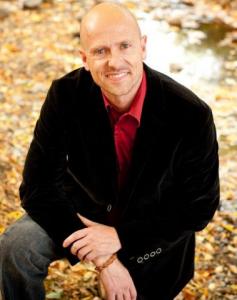 Rev. Roger Wolsey is a certified Spiritual Director, United Methodist pastor, and author of Kissing Fish: christianity for people who don’t like christianity
Rev. Roger Wolsey is a certified Spiritual Director, United Methodist pastor, and author of Kissing Fish: christianity for people who don’t like christianity
Click here for the Kissing Fish Facebook page
Roger’s other blogs on Patheos
** If you would like to become a patron of Roger’s work as a spiritual writer, please click here to learn more.

